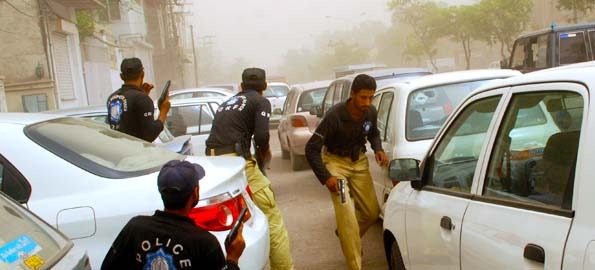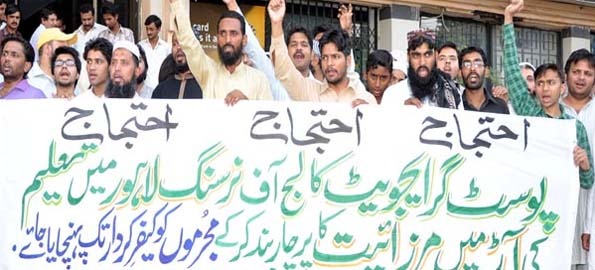Summary The paper analyses, through Pakistan’s history, a State sponsored persecution of the Ahmadiyaa community in Pakistan focusing on its discriminatory anti-Ahmadi laws that have made this religious minority sect the most vulnerable and oppressed community of Pakistan.
Background; Ahmadis in Pakistan and the beginning of discrimination
The calls for declaring Ahmadis a non-Muslim minority began since 1948 when a Muslim group called ‘Ahrar’ demanded removal of Ahmadi officials from their government posts including Pakistan’s Ahmadi Foreign Minister Zafarullah Khan.Jamaat Islami, Pakistan’s fundamentalist Muslim political party was also at the forefront of anti-Ahmadi campaigns.
Anti-Ahmadi agitation in 1953
In 1953, the movement against Ahmadis intensified and a first country wide agitation started against the Ahmadi community. Led by ‘Ahrar’ it resulted in riots all over the country that led to deaths of a number of Ahmadis. Ahmadi rallies were attacked, houses and shops set on fire and mosques raided. Ahmadis were ridiculed and humiliated in hate campaigns. A judicial inquiry was conducted into what is known as the ‘Punjab Disturbance of 1953’ that revealed political motives and Ahrar’s century old political enmity with the Ahmadiyya community was what caused the disturbance.The ‘Munir report’ revealed injustices done to the Ahmadis of which ‘Ahrar’ was found guilty. Moreover it was a political conflict between Pakistan’s largest political party, Muslim league and Jamaat Islami in which Ahmadis became an easy target for Islamist parties to use against the government of Muslim league.
This inquiry was the first and the only time State acted to protect the vulnerable community.
Anti-Ahmadi movement of 1974
A similar movement against Ahmadis in 1974 led to an amendment in the constitution that declared Ahmadis as not-Muslims. This was a unique case when a community’s faith was forcibly and against their wishes declared through legislation after a session of the National Assembly, in which Ahmadi delegation also participated but the publication of the details of the session was banned forever. And Pakistan became the only country in the world to have declared its 4 million Ahmadis non-Muslims with a constitutional amendment, according to Ehsan Rehan, the founder and editor of an online publication, the Rabwah Times, (that publicizes the issues Ahmadis face in Pakistan).
OrdinanceXX of 1984
General Zia in 1984 introduced an anti-Ahmadi ordinance with which started a more organized persecution of the religious sect under the cover of law. Sections 298-B and 298-C were added to the Pakistan Penal Code. According to the Ordinance Ahmadis were not allowed to call themselves Muslims, refer to their place of worship as ‘mosque’, recite the ‘azan’ or refer to their call for prayers as ‘azan’, recite the ‘kalima’ or say the Muslim greeting ‘Salaam’. Calling himself a Muslim was a criminal offense for an Ahmadi that could lead to 3 years imprisonment and fine.
Violation of Human rights and international law
Ordinance XX was a direct violation of the religious right of Ahmadis that restricted their freedom of religion.
In International Law it clearly violates Article 18 of the Universal declaration of Human rights that says; “Everyone has the right to freedom of thought, conscience and religion; this right includes freedom to change his religion or belief, and freedom, either alone or in community with others and in public or private, to manifest his religion or belief in teaching, practice, worship and observance.”
This is important and relevant for Pakistan because Pakistan made its commitment to religious freedom with Pakistan’s representative to the United Nations endorsing Article 18 of the Universal declaration of Human rights in 1948.
Pakistan’s discriminatory anti-Ahmadi laws also violate article 6 and 7 of the U.N. Declaration on the Elimination of All Forms of Religious Intolerance and of Discrimination Based on Religion or Belief; The International Covenant on Civil and Political Rights because Pakistan forbids Ahmadis to say certain Islamic words despite their wishes and imposes punishment on violation.
1993; The Case of Zaheeruddin Vs State
In 1993 eight appeals were brought in the Supreme Court of Pakistan against anti-Ahmadiyya laws on grounds that they were violating constitutional rights of Ahmadis but the Supreme Court ruled in favor of Ordinance XX stating that since Ahmadi practices offended the Muslim majority of Pakistan hence their practices needed to be controlled by law.
International concerns and reports
Amnesty International called on Pakistan to amend its blasphemy laws and ensure the implementation of Article 18 and guarantee protection of religious minorities.
Similarly In 1985, when Pakistan was a member of the U.N. Sub-Commission for the Promotion and Protection of Human Rights, a report of the U.N sub commission on prevention of discrimination and protection of minorities condemned the Ordinance for it violated the right of the religious minority to practice their religion however all the international concerns have gone unheard by the Pakistani State.
Statistics Since 1984 around 208 faith-based killings of Ahmadis have taken place including a terrorist attack on Ahmadi mosque in 2010 that claimed 94 lives. A number of Ahmadi worship places have been demolished, sealed and forcibly taken over by the government, and Ahmadis graves have been desecrated. In 2008 the whole population of Rabwah town (90% Ahmadi population) was booked for celebrating Century of the Ahmadiyya Muslim Community as Ahmadis are not allowed to hold public gatherings.
Discrimination against Ahmadis-Personal perspectives
According to Ahsan Iftikhar Nagi, an Ahmadi living in Lahore, life is not easy for Ahmadis in Pakistan with widespread discrimination in educational institutes and offices and no freedom to practice faith. Ahmadi students are not granted admissions and teachers and students are expelled if their faith is revealed “When i was in hostel my fellow students used to avoid talking to me or sharing food with me” shared Ahsan. “Every now and then Kalima is erased from the Ahmadiyya Mosques. Ahmadi graves are exhumed, by the Islamic clerics. Where should we go to get justice?” says Ahsan. While he is vocal about the role of State against the Ahmadi community and doesn’t believe in hiding his identity not everyone can gather the same courage considering Pakistan’s troubled situation. An Ahmadi friend who currently lives abroad wished to remain anonymous while sharing his own experience in Pakistan when he lived in the Country. “I have been out of Pakistan since 1963 but I remember even at that time when my Quran teacher found out I was an Ahmadi he mistreated me by throwing me out of the class when he taught people how to read the Quran!”
Ehsan Rehan,believes the current situation is not any better than Zia and Bhutto eras’ but seems to have got worse after 2010 attacks and hence revealing his religious sect for an Ahmadi comes with risk. “I had one of my very close friend threatened by his own colleagues after they found out he was Ahmadi’’ says Ehsan who believes amongst other things revealing his religious beliefs can get him social boycott and humiliation. ‘’And a close friend of mine who is studying at King Edward medical college Lahore has been excommunicated by whole of his class and hostel.” He said. Pakistani Ahmadis cannot visit the Muslim holy places in Mekkah despite their wish because of their passport mentioning their religion. They also cannot vote as to vote they are put on a separate voter list that’s titled for non-Muslims.
Case of Pakistan’s Ahmadi heroes
Ehsan also talks of how Pakistan has failed to even honor its Ahmadi heroes including Professor Abdus Salam who got the Nobel prize for Pakistan but his grave was disrespected with the removal of ‘Muslim’ from his grave. Similarly, Iftikhar Janjua, Ahmadi war hero who became the only general to die in war was never given the honor he deserved.
Conclusion
Human Rights Organizations have done good work to publicize the issue but they are bound by Pakistan’s anti Ahmadi laws.
With the growing culture of religious extremism and intolerance in the Country, Ahmadis have been the worst affected with State laws legitimizing the persecution of Ahmadis. Pakistan needs to get rid of its anti Ahmadi laws that are a clear violation of not only International laws and human rights but also Pakistan’s own constitution.



![sho_rabwah_police_killed[1]](https://www.rabwah.net/wp-content/uploads/2012/03/sho_rabwah_police_killed1.jpg)